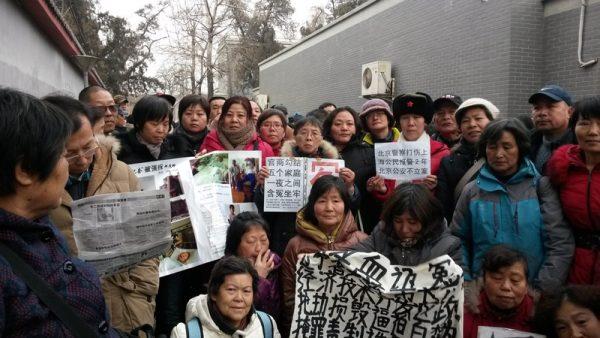In the hope of having their grievances redressed, Chinese petitioners from all over China visit the state petitioning office in Beijing. This week, however, the annual “Two Sessions” meeting has seen increasing numbers of petitioners being detained in Beijing and across the country due to heightened security around the state meetings.
The “Two Sessions” are the Chinese communist regime’s annual plenary sessions, where the rubber-stamp National People’s Congress and the Chinese People’s Political Consultative Conference meet simultaneously in Beijing. Held separately, the meetings are marked each year by massive increases in security and surveillance.
Nipping Dissent in The Bud
Chinese citizens understand that petitioners will often be detained by the authorities around the times and locations of “sensitive events”—such as National Congress meetings, or the anniversary of events such as the Tiananmen Square Massacre on June 4. This is recognized as standard practice for the regime, as it views petitioners and protestors as the so-called “unstable elements” of the “harmonious” society the Chinese Communist Party (CCP) seeks to impose.In addition to hardcore Party cadres and officials, regular delegates and other representatives of Chinese society have arrived at the “Two Sessions” in Beijing—and the regime considers it important that such persons should not witness any of these “unstable elements,” or hear what they have to say.
The regime also patrols train and bus stations in other cities to prevent protestors from arriving in Beijing in the first place, and even from protesting in other cities.
As of March 2, at least 31 petitioners from Shanghai have been illegally placed under residential surveillance or illegally detained in black jails, while some of them have gone missing entirely, according to Shanghai rights petitioner, Song Jiahong. Black jails are unofficial detention centers the regime uses to lock up protestors—often indefinitely.
“The Shanghai authorities have really accomplished ‘Nipping all unstable elements in the bud,’” Song said.
Song said he has tried to relay the latest information about Shanghai petitioners online, but that none of his methods worked—whether it be text messages, photos, or notes.
“I finally sent it out as a ‘document,’ which can only be viewed, but not transferred,” he said, stating that China’s high-tech surveillance systems have made it very challenging for him to transmit any information to his contacts.
Song wanted to let his fellow Chinese people know that black jails have been set up in motels and even farm resorts, and are being guarded by personnel of unknown identity. “The government paid for everything. It’s exploiting tax money to suppress the taxpayers,” he said.

Even Taxi Drivers Could Be Implicated
Hailing from northeastern Heilongjiang Province, petitioner Ma Bo revealed that another petitioner, Geng Shouxia, was met by police at her local train station on her way to Shenyang Second Circuit Court to file a petition on March 1.The police wanted to know how she managed to get to the train station, and insisted that she reveal the taxi driver’s license plate number.
“I did not write down the number,” Geng told the police.
Eight Security Personnel For One Petitioner
On March 2, Fan Yanqiong, a petitioner, writer, and 2011 Hellman/Hammett Award winner from China’s southeastern Fujian Province, wanted to petition authorities in Hangzhou, some 290 miles north of Fujian.Early in the morning, however, five men and three policemen were already waiting outside Fan’s home. They shadowed her all the way to the subway, where they then surrounded her and prevented her from going further.
According to Fan, she wished to seek redress after becoming disabled due to what she called China’s “industrialized” medical system. Fan said she lost one of her kidneys because of her doctor’s malpractice in 2015, when an illegal stent was implanted into her kidney. Since then, she’s been fighting for her rights as a victim of malpractice. She said, “It has been eight years, and the court has not given me an answer.”
Following her experience, Fan exposed how some doctors in China would conduct unnecessary operations with illegal and inferior medical apparatus. Such operations are carried out with the goal of earning commissions that can be as high as 40 percent, but that often result in injury to and even the death of the patients.
Fan said that in 2019, her husband also died of medical malpractice.
“Nothing is clean under the rule of the CCP,“ Fan said. ”The only thing they care about is ramping up their surveillance of me.”




